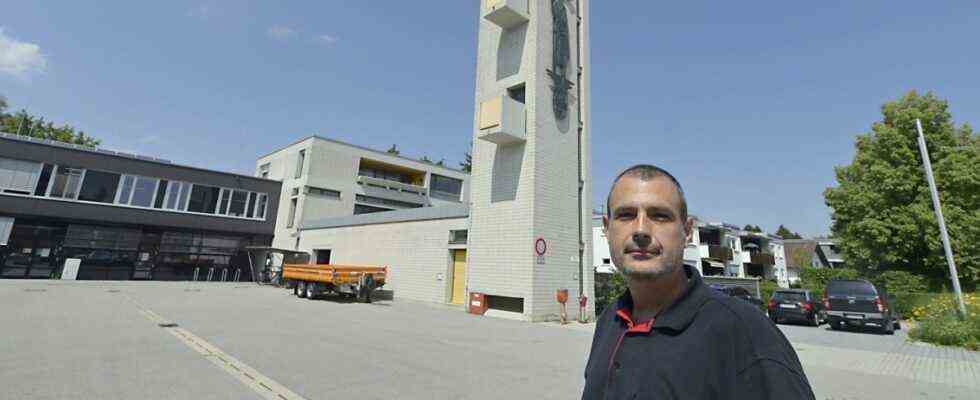Spontaneous visitors don’t come to the Ottobrunn fire brigade too often. And so Eduard Klas seems a little surprised when suddenly a woman stands in front of him in the entrance area and – behind the mask of course – says: “I just wanted to say thank you.” Then it occurs to the commander of the volunteer fire brigade. “Ah, your kettle burned, right?” Says Klas. “But nothing to thank, the important thing is that nothing happened to you.”
The water heater. It is just one of the many occasions that the volunteers of the Ottobrunn fire brigade call out about a thousand times a year. And there are more and more deployments from year to year. Because the community continues to grow despite its limited possibilities, the smallest place in the district in terms of area now has around 23,000 inhabitants. “And with every new citizen, every new business, we have more work,” says Klas on a tour of the fire station.
The sources of danger are not only lurking in the kettle; the fire fighters have them right in front of them every day at their own station. The fire brigade building, which dates back to 1969, is in urgent need of renovation: asbestos is still built into the walls and ceilings, the building technology, according to Klas, is “an energetic disaster” and – no joke – there are significant deficiencies in fire protection in particular. All in all, according to the Munich architects’ office Goergens, a general renovation would cost around eight million euros. A lot of money for a municipality like Ottobrunn, which – unlike Unterföhring or Grünwald – is primarily dependent on income tax and does not benefit much from trade tax.
“We always treated the house with care,” says Klas as he goes down the stairs to the basement. There he opens the door to the sanitary facilities, the toilets still look like they did in the 1970s – the firefighters only added a urinal themselves. How they repaired or built so many other things on their own and with funds from the fire brigade association: The rustic parlor in the basement for the slightly more than 100 volunteers and 20 youth fire fighters, which can only accommodate 40 at a time. The “large kitchen”, as Klas calls it, a work area measuring a few square meters, in which the Ottobrunn population would also have to be supplied in the event of a disaster, such as a power failure. A small beer garden in the courtyard.
Outside the guard again, Klas points to the guard’s tower, which can be seen from afar, to which two balconies are attached. “We need the tower for our exercises,” explains the commander. However, it is only of limited use for exercise purposes, because the balcony, which should actually hang at the height of a first floor, actually simulates a second floor. “That is the stair joke par excellence,” says Klas.
This problem should also be eliminated with a general refurbishment. But that is a purely political decision, and the Ottobrunn municipal council is faced with two difficult questions: How much money is the fire brigade worth to them? And how does he envision a modern, well-positioned task force for the future? In April, the committee discussed a possible renovation for the first time and doubts arose – especially among the Greens – whether the fire brigade needed a new large kitchen in the basement. The SPD also expressed concerns; it brought into play the need to streamline the measures in terms of time.
Commander Klas wants to dispel the doubts. “I understand the local council. They think in terms of completely normal, everyday things like daycare centers, kindergartens and schools,” says Klas. “But the entire infrastructure has to be taken into account, and that includes us as a pillar in the event of a disaster.” And this crucial pillar, according to Klas, must be anchored in the middle of society. “That’s why we told the local council three years ago that we need more living space for our people.” There are currently two apartments on the second floor of the fire station; Three young women from the fire brigade live together in a shared apartment, the other is occupied by another fire fighter. “But that’s not enough,” says Klas. “We have young, committed comrades here who are learning leadership skills and who may at some point want to move in with their girlfriends or expand.” If it is not possible to keep these offspring with cheap living space in town, these volunteers from the fire brigade could be lost. “And that endangers our work,” says Klas. In addition, short distances for the fire brigade would make the work easier: “I would like to have people here so that we can react quickly. According to the statutory deadline, we have to be on site ten minutes after the alarm has been raised.”
Sometimes the commander feels misunderstood by community politics in his request to make the fire brigade fit for the future. “Every now and then I have the feeling that if the fire brigade wants something, it is seen in a bad light,” he says. “It’s a chewing gum discussion, like in a tough bubble.” The fire brigade does not demand that everything be brought up to date in one fell swoop: “But something has to happen in the next six years,” demands Klas. Before the fire department burns – which nobody wants.

